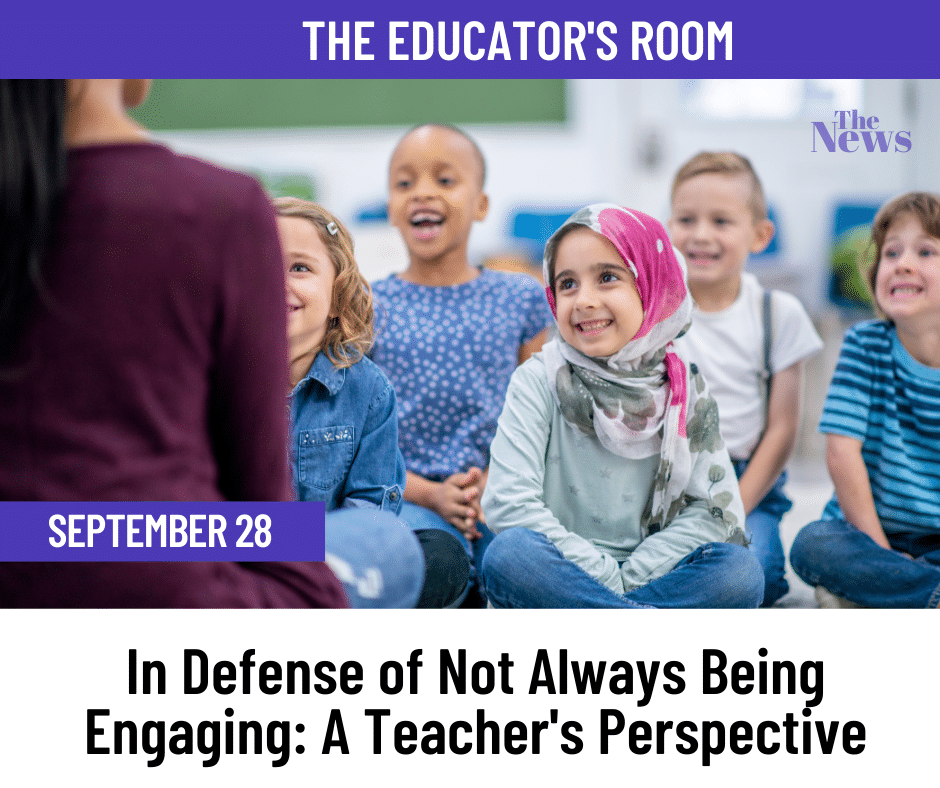Teachers are constantly told today to “be engaging!” That incredibly vague buzzword is laced with pressure and expectations that many teachers find overwhelming. We are shown videos of the perfect teacher giving the perfect lesson – you know the type: there’s an expressive and passionate overdressed educator floating around the room, the kids are wide-eyed and locked in, and there is a buzz in the room that you can’t quite describe. This is seen as the goal – the classroom should be an engaging, revolutionary, fun, and exciting experience for students.
But is that realistic?
As a 24-year-old teacher, I am not too far removed from my own educational experiences. I remember when I was in school that there were really special days – like the time we did a daisy chain activity in Physics, or when we drew our own version of Dante’s Inferno in English. Those stand out to me because they were special, but that is not to say that every other day in school was miserable. There were days we had to take notes, or complete math test prep, or take exams. But that is part of education, is it not?
I am constantly seeing teachers beg each other for engaging activities for every single topic they will cover in class. I also see educators stress over an administrator popping in on a day they were “just doing a reading comprehension” as if they had failed to be a good teacher by doing so. In many teacher prep courses, professional development trainings, and articles for teachers the same idea is pushed – you need to be gripping every minute in the classroom.
I don’t buy it.
Look, it is great to be engaging, and I absolutely encourage teachers to find ways to make the content more interesting for students. Specifically, I have always advocated for making connections to students’ lives and finding ways to leverage their personal experiences and background in the classroom. However, not everything about school and learning is fun. Unfortunately, engagement has become synonymous with students having fun. I want to talk about this specific brand of engagement.
I am a teacher, I am not an entertainer. I live and breathe for my students every single day, but I have to be realistic. I am not going to make TikTok videos to get my students to log into online learning. That isn’t because I am a bad teacher, it’s because I have boundaries. I am also not going to meaningfully integrate technology into every lesson, have a hands-on activity every single day, or be a master storyteller all the time. Can anyone really do this all the time, every single year?
[bctt tweet=”It is also incredibly exhausting and hard to keep up with as an educator – besides coming up with these unique ideas, most of them require a lot of set-up before class.” username=””]
When you do the fun and exciting stuff all the time, it lessens the impact for the next time and the time after that. It is also incredibly exhausting and hard to keep up with as an educator – besides coming up with these unique ideas, most of them require a lot of set-up before class. This is not sustainable for your teaching career. As for the students, sometimes they need a break too! Kids want to do fun activities, but sometimes they also just want to sit and have a regular class. You will burn them and yourself out by constantly doing lessons worthy of a Hallmark movie.
I also want to point out what a disservice this huge push for engagement is for our students. When they go to college or work, it isn’t fun activities and hands-on experiences. College tends to be direct instruction, note-taking without fill-in notes, and tons of self-direction with reading and homework assignments. At work, they may have to sit through boring staff meetings, lengthy training, and be stuck at their desk for most of the day doing mind-numbing work. They will experience a culture shock and either has to quickly adapt – or worse – drop out, quit, or be fired because they are not capable of being in a “boring” environment.
Students are already addicted to screens, video games, and social media – and we say that their attention spans are shrinking. So what do we do for school? We decide to give them all screens and gamify as many lessons as we can. But our world does not operate the same way – and it honestly shouldn’t. I don’t want to go to the DMV and complete an obstacle course to get to the front of the line or play a trivia game with my insurance provider to find out the information I need before I get my flu shot.
Sure, there are jobs like Google that look fun – but ultimately those workers are working their butts off every day when the marketing cameras leave. Plus, there are many jobs in the world that are not super exciting but are critical to the function of society. But when we push for nonstop fun in the classroom, we forget how to prepare kids for when things aren’t fun. They will have no tolerance or stamina for when things get slow, or boring, and what will they do then? How will they be equipped with the skills necessary to proceed in those situations when no one has ever put them in such a situation before?
I think many teachers are doing beautiful things in their classrooms. But I want the overwhelmed teachers who are at a loss for how to make everything engaging to know that they aren’t a bad teacher if they have students take some notes or do an individual reading. Some days will absolutely be fun and engaging, some will just be engaging, and others will just be a regular class period. And that’s okay. There is always a balance and I think we need to remember engagement requires a balance too.






Excellent article! I appreciate this [dare I say unpopular?] viewpoint, particularly your argument about how this expectation/practice can be a disservice to our students. Should we explore ways to make our content relevant? Interesting? Applicable to students’ real lives and the world around us? Yes, of course! Do we need to burn ourselves out by gamifying everything so that students feel like they’re just playing and not learning? Absolutely not.
I remember being a new teacher and laughing in a staff meeting because the idea – “if your students aren’t engaged, it’s all your fault” – seemed so ludicrous to me. Then I realized my administrators were serious. What an interesting profession we have: others’ (students’) successes are theirs to claim, their achievements to own, while their failures are often heaped upon our shoulders despite our greatest efforts.
Boundaries are OK. We cannot be everything to everyone all of the time. To me, the key is not about engaging students or trying to make everything fun. I believe the most important thing is that we do our best to connect with our students, showing them we genuinely care about them. When they feel seen, heard, and valued, students care and want to do well.